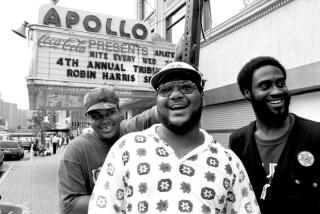Opinion: De La Soul surfs a non-Tidal wave
- Share via
On the same day that some of the biggest names in music announced their collaboration on a subscription music service called Tidal, the trip-hop artists De La Soul announced a campaign on Kickstarter to raise the money to record and release its first new studio album in more than a decade.
Both efforts germinated from the same intellectual seed, to wit, the musicians’ desire for more control over their own destinies. In the case of Jay Z and the other elite artists behind Tidal, that meant offering their music in better sound quality and, potentially, capturing more of the revenue it generates.
In the case of De La Soul, that meant being able to pay for the new record without becoming indebted to a label that would interfere with its product.
“We’re crowdfunding it to help pay for recording, mixing, marketing, and everything else,” the three members of the group wrote on their Kickstarter page. “Your support will keep us in the studio, help us continue to sample and manipulate the music we’ve recorded, will help us get additional production work done; and will help us design, package, market, and distribute the album. The whole thing. We literally cannot do it without you.”
There’s no telling yet whether Tidal will be able to grow its tiny subscriber base into a sustainable business. But De La Soul has a true Kickstarter hit on its hands; having set a goal of $110,000, it raised more than $275,000 in pledges by Wednesday afternoon.
The effort is among the most successful Kickstarter musical projects ever, raising $200,000 faster than all but one other artist (that would be Amanda Palmer).
Although De La Soul’s experience isn’t typical, it’s hardly the only act to raise enough money on a crowdfunding platform to make and distribute a record. According to Kickstarter’s Julie Wood, “19,000 other music projects have been successfully funded” through the platform.
This illustrates one aspect of the music business that hasn’t changed as analog has given way to digital and Tower Records has been replaced by the iTunes Store, Spotify and illegal downloading: the core of the business is the relationships that artists build with their fans. Kickstarter is simply giving people a new way to do something they’ve always done, namely, spend money on a band they love.
Tidal doesn’t make that kind of connection. Subscribers ante into a pot that gets divided broadly among all the recording artists and songwriters whose works get played. And because each artist’s share is based on how popular their works are, there’s no relationship between the artists whose tracks you play and the ones who get your money. Unless, of course, they’re the same artists everyone else plays.
Nevertheless, some Tidal supporters say consumers will be drawn in by the higher royalties the service has said it will pay to recording artists and songwriters. The higher payments are possible because Tidal’s subscribers pay either $10 or $20 a month, not zero or $10, as is the case with Spotify and Rdio.
Maybe some consumers will be persuaded, but the connection between subscribers and artists on Tidal (or any other subscription service) seems far too attenuated for that. If you’re not using a subscription service today because you don’t think it properly compensates artists, increasing the amount of money in the royalty pool isn’t much of a selling point if you can’t make sure the artists you really like are getting any of it.
No, if that’s your motivation, you’re going to head over to Kickstarter and pledge $30 to De La Soul’s for the new album and an exclusive bonus track preloaded on a 1 Gb thumb drive from Kevin “Posdnous” Mercer (or, if you prefer, from Dave “Trugoy” Jolicoeur or Vincent “Maseo” Mason). Or one of the multiple other offers.
Tidal may find other ways to make that direct connection between artists and their fans. Subscription services are still in their relative infancy, after all. So far, however, they’ve been all about connecting people to an enormous online library of music, not engaging them directly with the acts they love.
Follow Healey’s intermittent Twitter feed: @jcahealey
More to Read
A cure for the common opinion
Get thought-provoking perspectives with our weekly newsletter.
You may occasionally receive promotional content from the Los Angeles Times.









